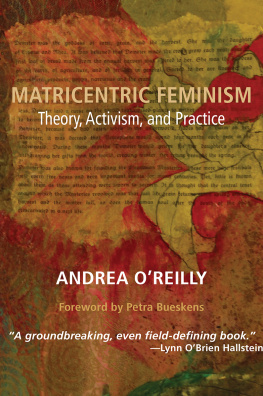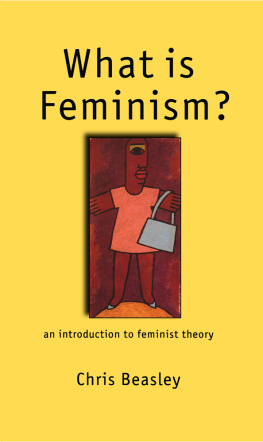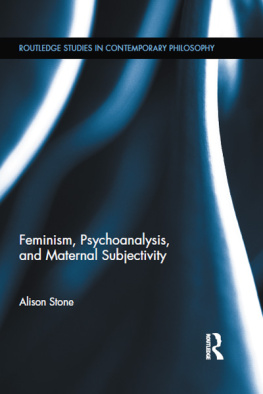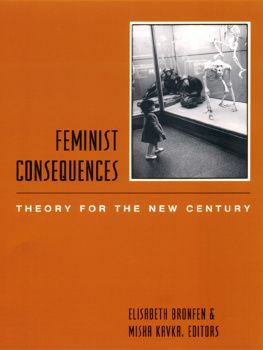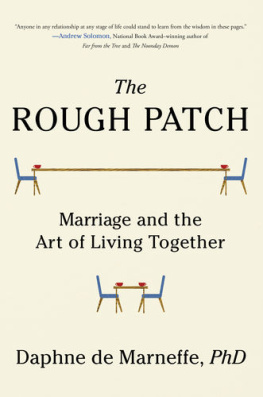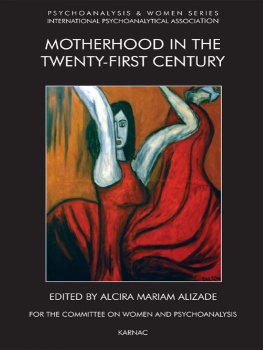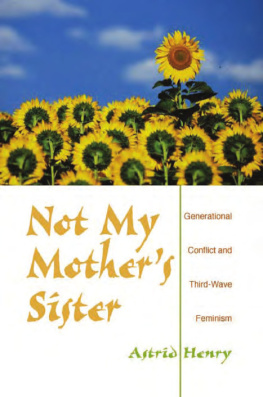Matricentric Feminism
Copyright 2016 Demeter Press
Individual copyright to their work is retained by the authors. All rights reserved. No part of this book may be reproduced or transmitted in any form by any means without permission in writing from the publisher.
Funded by the Government of Canada
Financ par la gouvernement du Canada

Demeter Press
140 Holland Street West
P. O. Box 13022
Bradford, ON L3Z 2Y5
Tel: (905) 775-9089
Email:
Website: www.demeterpress.org
Demeter Press logo based on the sculpture Demeter by Maria-Luise Bodirsky
< www.keramik-atelier.bodirsky.de >
Front cover artwork: Lisa Brouckxon, Andrea as Demeter, 2015, mixed media collage, 24 by 30 inches.
eBook: tikaebooks.com
Printed and Bound in Canada
Library and Archives Canada Cataloguing in Publication
OReilly, Andrea, 1961-, author
Matricentric feminism : theory, activism, and practice / Andrea OReilly.
Includes bibliographical references.
ISBN 978-1-77258-083-9 (paperback)
1. Feminist theory. 2. Feminism. 3. Mothers. 4. Motherhood. I. Title.
HQ1190.O74 2016 305.4201 C2016-906000-4
Matricentric Feminism
Theory, Activism, and Practice
ANDREA OREILLY

DEMETER PRESS
For Terry Conlin,
My most avid supporter, my toughest critic, my closest friend, and my partner in life.
TABLE OF CONTENTS
ACKNOWLEDGEMENTS
I opened the acknowledgements to my book Toni Morrison and Motherhood: A Politics of the Heart (2004) citing a quotation from Morrisons Song of Solomon . The narrator, commenting upon the importance of othermothering, says this about Hagar Dead: She needed what most colored girls needed: a chorus of mamas, grandmamas, aunts, cousins, sisters, neighbors, Sunday school teachers, best girlfriends, and what all to give her the strength life demanded of her-and the humor with which to live it (311). I believe that scholars, likewise, need a chorus of mamas to think and write well. Fortunately, I have been blessed with a symphony in my life. Over the past twenty-five years as I have thought and wrote about mothers, mothering, and feminism, my chorus of mamas bestowed upon me the strength a scholarly life demands and the humour with which to live it.
I am deeply grateful to the late Sara Ruddick for giving us a vision of empowered mothering in her book Maternal Thinking, and for championing me as I struggled to create my own. Thank you to the members of the Motherhood Initiative for Research and Community Involvement ( MIRCI ), in particular Petra Beuskens, Rebecca Bromwich, Deborah Byrd, Regina Edmonds, Linda Ennis, May Friedman, Jenny Jones, Linda Hunter, Laure Kruk, Memee Lavell-Harvard, Caroline McDonald-Harker, Lynn OBrien Hallstein, Liz Podnieks, and Marie Porter. My thinking on mothering was enhanced and sustained by this wonderful community of scholars. Thank you as well to my graduate students whose scholarship has enriched my own; in particular Vanessa Reimer, Gary Lee Pelletier, Melinda Vandenbeld Giles, Sarah Sahagian, Florence Pasche Guignard, Terri Hawkes, Paula John, Kaley Ames, Lisa Sandlos and Maria Collier de Medonca. I am deeply indebted to Nicole Doro for her proficient proofreading under impossible deadlines. A huge thank you to Angie Deveau for her brilliant and tenacious research on the place of motherhood scholarship in academic feminism and to Lisa Brouckxon for her beautiful art on the books cover. Special thanks to Petra Beuskens for her careful reading of the manuscript and for writing the splendid Foreword. And deepest thanks to Jesse OReilly-Conlin who, through his accomplished copy-editing not only created order from chaos but did so with good cheer and generous support.
My deepest gratitude goes to my children Casey, Erin and Jesse, and to my spouse Terry Conlin. Thank you, to paraphrase Emma Bombeck, for loving me the most, when I deserved it the least.
FOREWORD
Matricentric Feminism Is a Gift to the World
PETRA BUESKENS
W HEN I FIRST MET Andrea OReilly in 1999, she was not yet the famous professor of motherhood studies that she has become; she was an academic still struggling for tenure, mothering three children, working full time and publishing her first edited book. I saw her in a miniskirt by a vending machine with her characteristic bangled arms and had no sense that she was the professor I was here to meet. Over the course of that conference, we found deep common interests in our experience of becoming mothers in our early twenties and combining this with intensive graduate research. We also had a few too many wines and some adventures, which continue to animate our conversations to this day. Fast forward almost twenty years, and I am honoured to call her my friend, mentor, colleague, collaborator, and matricentric feminist conspirator.
Andreas persona is the most curious and contagious mix of passionate politics with professorial acumen; she is of working-class origins but has made it in the male-stream academic system giving her a radical edge. This standpoint is enlarged by having to live and breathe the contradiction that is being a mother (of three) in academe. She has something of the 1970s feminist about her, something of the mum at the school gate and something of the literary professor. This combines to make her a force of nature and a fierce creator of matricentric feminist communities and spaces. OReilly is indefatigable with her journal, her association (its demise as ARM and reinstatement as MIRCI ), her pressthe first feminist press devoted to the publication of books on motherhood, Demeter Pressher numerous conferences, publications, edited volumes, and last but not least, with her mentoring of matricentric feminist scholars and activists.
OReilly is one of those rare academicsrare under neoliberalism, and rare in disciplines like womens and gender studies, which are under resourced and lack prestigethat she is not competing with anyone she meets above, below, or in parallel to her own career trajectory (which is itself defined by a much broader agenda than success in academe). She advances the careers of others by publishing graduate studentsas she did meand by supporting and promoting mother scholars, writers, artists, and activists. What OReilly is interested in is the creation of a movement ; this enables her to hold together a multiplicity of diverse voices as is evidenced in this book, which is a veritable quilt of matricentric feminism.
Andrea has been a significant force in the creation of motherhood studies as an academic discipline and matricentric feminism as an intellectual and political force, and she does so in an uncharacteristically collectivist way. Many pay lip service to such an ethic, but Andrea puts it into practice in a way I have never quite seen before. This is because she is guided by her own matricentric ethic of care: the creation of matricentric feminist community and culture. It is not an exaggeration to say this movement would not exist without her. Or, to put it another way, Andrea is at the centre of a movement that came together, as she recounts, at the cusp of the twenty-first century from key texts from the late second-wave feminism and onwards. In contrast to the womens movement more generally, OReilly insightfully points out that scholarship predates and underscores the development of the mothers movement. In other words, the consciousness was raised, and then the groups were formed rather than the other way around.

